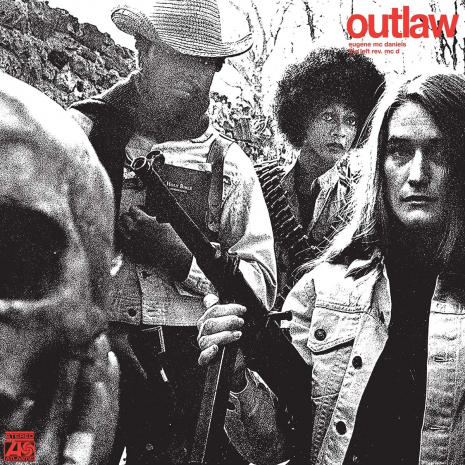
Although I was informed by the press release that Outlaw, the 1970 album by Eugene McDaniels was a cult favorite, it was honestly not something I was familiar with. But if I was crate digging and spotted this, I can assure you, I’d have taken it home, not unreasonably expecting that what was in the grooves would match such an audacious record cover. Take a look. You’ve got a bearded McDaniels, “the left rev mc d” as he then called himself, in a cowboy hat, holding a bible. He’s joined by two women, one holding a machine gun, the other wearing an ammo belt. A human skull directly in the foreground reinforces the mood.
“What the fuck is this?” you may ask yourself? The answer may surprise you. First of all, this is a folk-pop album and McDaniels seems to be trying (successfully) at times to sound like Mick Jagger, and his band sounds like the Stones of Let It Bleed. Odd that a black man would apparently model his vocal performance on a white man who’d copped his singing from R&B singers, but it works. A bit convoluted perhaps, trust me he makes it work. One song reminded me strongly of an outtake from the musical Hair. It’s a weird album, but a very, very good one. It’s just next to impossible to categorize. It’s country-rock-funk-folk. It’s got a good beat throughout.

Eugene McDaniels performing at a benefit for Angela Davis in Washington, DC
Unsurprisingly, Outlaw‘s politics are radical and deeply held. The lyrics—if not the music—are in-your-face, up-against-the-wall stuff. It’s interesting to note that McDaniel started off as a Jackie Wilson-type singer. His first hit record was the soul standard “A Hundred Pounds of Clay” and he worked with Snuff Garrett and Burt Bacharach early in his career. He’d also written the topical protest song “Compared to What” taking aim at Lyndon Johnson and his deeply unpopular Vietnam War, so Outlaw wasn’t completely out of the blue for the guy, but it was still unusual for just about ANY artist—Black or white—recording for a major label to affect such a radical image. Apparently, someone in the Nixon administration got wind of the track “Silent Majority” (“Silent majority / Is calling out loud to you and me / From Arlington Cemetery / To stand up tall for humanity”) and it was either Vice President Spiro Agnew or else Richard Nixon’s Chief of Staff who personally called Atlantic Records to complain, asking them to stop working with McDaniels.
Outlaw was produced by Grammy-winner Joel Dorn and arranged by William S. Fischer. Both had worked before with friends of McDaniels, like Roberta Flack (McDaniels wrote her “Feel Like Making Love” hit and other songs for the vocalist) and Les McCann and Eddie Harris (who turned his “Compared to What” into an electrifying jazz standard on their live Swiss Movement album in 1969). Their support is sympathetic to McDaniels’ goals, but you have to wonder what they made of such an almost deliberately uncommercial project. It’s one of those albums where you almost can’t believe it exists. I’m glad it does.
The Real Gone label’s 50th anniversary release of Outlaw comes in a neon red vinyl pressing limited to 700 copies.






